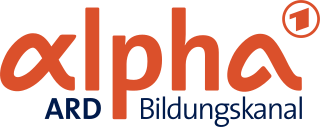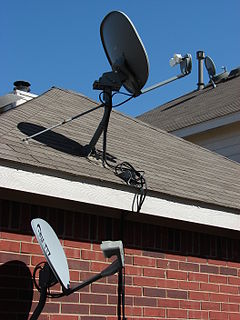The telecommunications and postal services market in Greece is regulated by the Hellenic Telecommunications and Post Commission (EETT).
Digital radio is the use of digital technology to transmit or receive across the radio spectrum. Digital transmission by radio waves includes digital broadcasting, and especially digital audio radio services.
Television broadcasting in Greece began in 1966 and this was preceded in 1951 by statute 1963 permitting television broadcasting.

Star Channel is a Greek free-to-air television channel that broadcasts a mix of foreign and Greek shows. It was launched in December 1993 and is owned by New Television S.A.

Alpha TV is a Greek free-to-air channel. With Antenna TV it is one of the two biggest stations in Greece, after the collapse of the Mega channel, due to financial problems. The station features a mix of Greek and foreign shows with an emphasis on information. The studios are located near Athens. Alpha TV is owned by Alpha Satellite Television S.A. 100% shareholder of which is the Alpha Media Group Ltd. In Cyprus, private broadcaster Sigma TV used to broadcast a number of Alpha TV's programs. In the past, public service broadcaster CyBC used to broadcast Alpha TV programs. In 2015, Alpha TV Cyprus was founded and it broadcast the Alpha TV Programs and others of its own. Alpha Cyprus now is one of the highest-rated Cypriot channels.
The S band is a designation by the Institute of Electrical and Electronics Engineers (IEEE) for a part of the microwave band of the electromagnetic spectrum covering frequencies from 2 to 4 gigahertz (GHz). Thus it crosses the conventional boundary between the UHF and SHF bands at 3.0 GHz. The S band is used by airport surveillance radar for air traffic control, weather radar, surface ship radar, and some communications satellites, especially those used by NASA to communicate with the Space Shuttle and the International Space Station. The 10 cm radar short-band ranges roughly from 1.55 to 5.2 GHz. The S band also contains the 2.4–2.483 GHz ISM band, widely used for low power unlicensed microwave devices such as cordless phones, wireless headphones (Bluetooth), wireless networking (WiFi), garage door openers, keyless vehicle locks, baby monitors as well as for medical diathermy machines and microwave ovens. India's regional satellite navigation network (IRNSS) broadcasts on 2.483778 to 2.500278 GHz.
PrimeStar was a U.S. direct broadcast satellite broadcasting company formed in 1991 by a consortium of cable television system operators and GE Americom, the satellite arm of General Electric, collectively referred to as the PrimeStar Partners. PrimeStar was the first medium-powered DBS system in the United States but slowly declined in popularity with the arrival of DirecTV in 1994 and Dish Network in 1996.
Television in Germany began in Berlin on 22 March 1935, broadcasting for 90 minutes three times a week. It was the first public television station in the world, named Fernsehsender Paul Nipkow. The German television market had approximately 36.5 million television households in 2000, making it the largest television market in Europe. Nowadays, 95% of German households have at least one television receiver. All the main German TV channels are free-to-air.
AlphaStar Digital Television was a direct-to-home satellite broadcasting service for the United States market developed by Canadian firm Tee-Comm Electronics. It was the first direct-to-home satellite broadcasting service in the United States to use the internationally accepted DVB-S broadcasting standard and used 39" satellite dish receivers. AlphaStar service launched in July 1996 but was discontinued completely by September 1997 with 40,000 subscribers as the company went through bankruptcy proceedings. The American assets of AlphaStar continue to be used under the auspices of the Champion Telecom Platform which also continues to own the AlphaStar brand. AlphaStar would also have alleviated a shortage of Canadian satellite capacity by using foreign (US) satellite capacity to fill Canadian needs—indeed this was a requirement for the Canadian company to obtain its license from Canada to commence broadcasting. Tee-Comm, the parent company of AlphaStar had originally co-founded the partnership that created ExpressVu as technology supplier but later divested all interest in ExpressVu.
The Champion Telecom Platform operated a satellite teleport facility in Connecticut that was acquired from the failed AlphaStar satellite direct-to-home television service.
TV/COM International is a company that developed the Compression NetWORKS digital broadcasting system that evolved into the current DVB-S standard for digital satellite broadcasting. It was used by the short-lived AlphaStar satellite platform for content delivery and conditional access. TV/COM was formed from the former Oak Communications in San Diego to develop its Compression NetWORKS system. The company was bought by Hyundai in 1994 and became a wholly owned subsidiary of Hyundai. The company was eventually closed and its intellectual property sold to Irdeto in The Netherlands.
Compression Networks is a digital content delivery system developed by TV/COM International that evolved into the current DVB-S standard for satellite broadcasting. The system provided MPEG2 video, audio, signalling, enhanced program guide, and conditional access for pay-television services like AlphaStar.
Satellite television is a service that delivers television programming to viewers by relaying it from a communications satellite orbiting the Earth directly to the viewer's location. The signals are received via an outdoor parabolic antenna commonly referred to as a satellite dish and a low-noise block downconverter.
ETSI Satellite Digital Radio describes a standard of satellite digital radio. It is an activity of the European standardisation organisation ETSI.

Pacific Broadcasting Services is a company jointly owned by City West Centre Broadcasting Services and BPHCL. Its core business is to deliver satellite subscription television and radio broadcasting services to the Fiji Islands and surrounding markets, focussing on both Hindi and English speaking households and commercial outlets.

ARD-alpha is a German free-to-air television channel run by regional public-service broadcaster Bayerischer Rundfunk. Its programming consists of shows made by Bayerischer Rundfunk, as well as from ARD and Austrian broadcaster ORF. The channel was originally called BR-alpha but was rebranded as ARD-alpha on 29 June 2014.

Currently, there are two primary satellite television providers of subscription based service available to United States consumers: DirecTV and Dish Network, which have 21 and 10 million subscribers respectively.

StarSat is a South African direct broadcast satellite television service that began broadcasting on 1 May 2010. StarSat is operated by On Digital Media, who were granted a pay-TV license by ICASA in September 2007. On Digital Media is currently 20% owned by Luxembourgish satellite operator SES and 20% owned by Chinese company StarTimes. StarSat's service is aimed at the LSM 6-9 demographic, targeting middle class viewers.
Digea is a Greek network operator that provides a digital terrestrial television system in Greece for seven nationwide free-to-air channels. In addition to these free-to-air nationwide stations, the network is open to any other station choosing to use its services.
This page is based on this
Wikipedia article Text is available under the
CC BY-SA 4.0 license; additional terms may apply.
Images, videos and audio are available under their respective licenses.





